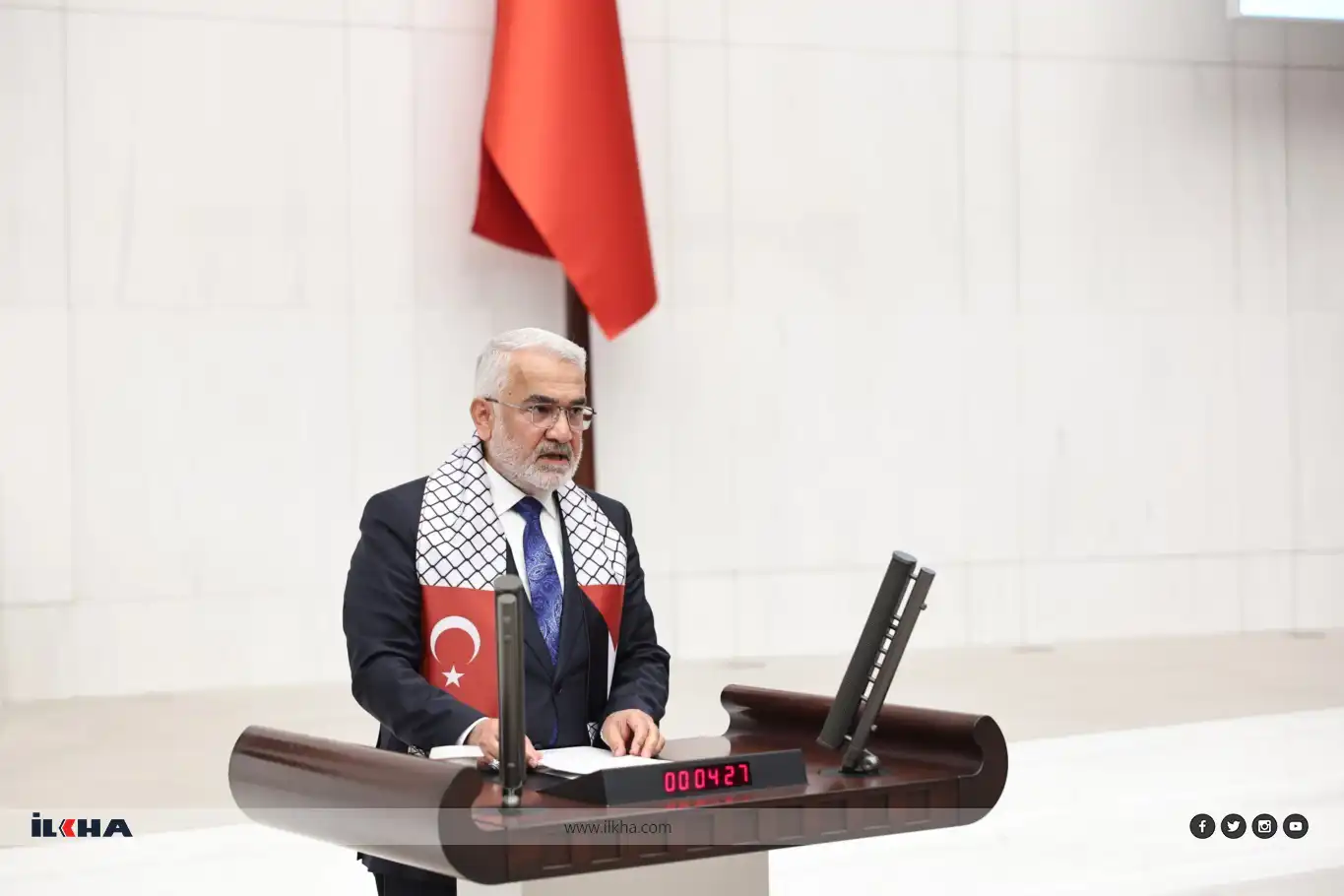HÜDA PAR Chairman calls for Türkiye to suspend recognition of Israel


HÜDA PAR Chairman Zekeriya Yapıcıoğlu issued a forceful call in the Turkish Grand National Assembly (TBMM) on Friday for Türkiye to suspend its recognition of Israel and to urgently enact legislation that would criminalize genocide.
His speech came during an extraordinary parliamentary session convened to address Israel’s ongoing genocide in Gaza, now in its 22 month.
The genocide has killed more than 63,000 Palestinians, displaced millions, and plunged Gaza into famine and devastation. Yapıcıoğlu’s remarks, delivered with fiery conviction, framed the Palestinian struggle not only as a political issue but as a moral and humanitarian imperative.
Yapıcıoğlu denounced Israel as a state without legitimate foundations. “Israel has no defined borders, no shared culture, and no rightful claim to the land it occupies,” he declared. “It is an artificial construct, born out of colonialism, sustained by dispossession and terror.”
Recalling Türkiye’s decision in 1949 to become the first Muslim-majority country to recognize Israel, he argued it was time to reconsider.
“Why should we continue to recognize a regime that exists solely through occupation, theft, and genocide?” Yapıcıoğlu asked. “If this parliament has courage, let us revoke—or at least suspend—that decision.”
The HÜDA PAR leader criticized what he described as the “politics of empty condemnations” by world powers in the face of Israel’s attacks. He highlighted Israel’s defiance of UN Security Council ceasefire resolutions and the global community’s failure to stop the violence.
“For nearly a year, children in Gaza have starved, families have been obliterated, and homes reduced to rubble, while the so-called international community offers nothing but platitudes,” he said. “Enough! Words cannot feed the hungry or stop Israeli bombs. The time for action is now.”
A central focus of Yapıcıoğlu’s speech was his demand for parliament to finally pass a long-pending genocide law. The bill, submitted last year by HÜDA PAR and eight other parties, would criminalize complicity in genocide, both within Türkiye and abroad.
“This law is not just a legal necessity—it is a moral obligation,” he stressed. “If we cannot yet reach our brothers and sisters in Gaza, we can at least strike at the enablers of genocide here at home.”
The legislation would empower Turkish authorities to prosecute individuals, companies, or institutions that provide financial, trade, or logistical support to genocidal acts—including businesses linked to Israel’s war effort.
In another bold proposal, Yapıcıoğlu urged Türkiye to reaffirm the 1975 UN Resolution 3379, which defined Zionism as a form of racism and racial discrimination. The resolution was revoked in 1991 under U.S. pressure.
“Zionism is an ideology rooted in ethnic cleansing and apartheid,” he said. “As Gaza is starved, bombed, and erased, this truth is undeniable. Let Türkiye restore that moral clarity.”
Positioning the Palestinian cause as a universal struggle, Yapıcıoğlu appealed to lawmakers across party lines. “The fight for Palestine does not belong to the right or the left, to Islamists or secularists—it is a cause for all of humanity,” he said. “If we fail to act, we fail not only Palestine but our own conscience.”
He underlined the urgency of the crisis: Gaza’s children, he noted, are dying not only from bombings but from hunger and disease caused by Israel’s blockade.
Analysts suggest that if Türkiye were to suspend recognition of Israel, it would mark an unprecedented step among major regional powers, potentially inspiring others such as Pakistan and Malaysia to follow suit.
Recent initiatives reflect Ankara’s rising assertiveness on Palestine. President Recep Tayyip Erdoğan has repeatedly branded Israel a “terror state” and accused it of war crimes, while Türkiye has championed Palestine at the UN and international forums. The Istanbul Declaration, adopted during the August 29 Gaza Conference at Hagia Sophia Grand Mosque, echoed Yapıcıoğlu’s stance by calling for boycotts, legal accountability, and breaking Gaza’s blockade.
Yapıcıoğlu’s speech also resonated with Türkiye’s grassroots activism. Boycott campaigns targeting Western brands like Coca-Cola and Starbucks—accused of supporting Israel—have gained strong momentum. Social media campaigns have amplified calls for cutting ties with companies linked to Israel, reflecting widespread anger over Gaza’s suffering.
Legal experts argue that a genocide law would strengthen both domestic and international accountability. “Türkiye has the legal infrastructure and political will to lead,” said human rights lawyer Leyla Aksoy. “A genocide law would send a clear signal that complicity in Israel’s crimes will not be tolerated.”
Closing his speech, Yapıcıoğlu declared: “Let us not fear the anger of the oppressors. Let us instead earn the prayers of the oppressed. Long live hell for tyrants. Long live freedom for Palestine!”
His words, met with applause in the chamber, echoed far beyond parliament. For supporters of Palestine across Türkiye and the Muslim world, the call underscored what many see as a historic responsibility for Ankara: to take bold action where the international community has failed.
As the TBMM debates Yapıcıoğlu’s proposals, Türkiye faces a defining moment—one that could shape not only its regional role but also the broader global reckoning with Israel’s ongoing genocide. (ILKHA)
LEGAL WARNING: All rights of the published news, photos and videos are reserved by İlke Haber Ajansı Basın Yayın San. Trade A.Ş. Under no circumstances can all or part of the news, photos and videos be used without a written contract or subscription.
Turkish President Recep Tayyip Erdogan held a telephone conversation with his Venezuelan counterpart, President Nicolás Maduro, on Friday, discussing bilateral relations and regional developments.
Ahead of a major panel on drug addiction, HÜDA PAR Youth Branch Chairman Murat Günaydın has described drug use as a “global threat” and a “poisonous vortex” that is rapidly swallowing Türkiye’s young people and pushing society toward chaos.
Türkiye’s Ministry of Foreign Affairs has issued a statement welcoming the signing of the Washington Accords for Peace and Prosperity between the Democratic Republic of the Congo (DRC) and Rwanda.
The Religious Affairs Directorate (Diyanet) of Türkiye released the official Friday sermon, delivered in mosques across the country, focusing on the central role of worship in achieving personal and societal peace.